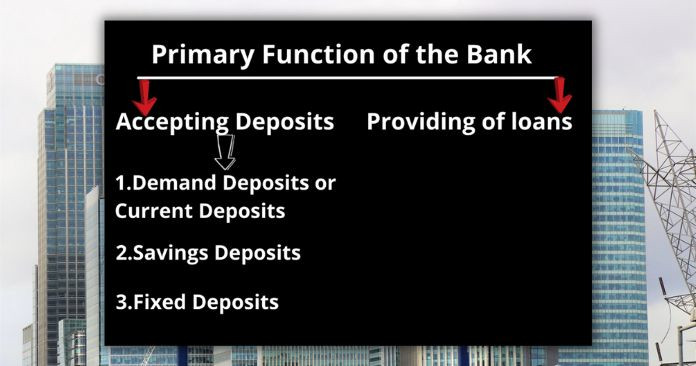The functions of commercial banks can be divided into three main parts.
- Primary Function
- Agency Services
- General Utility Services
Primary Function of the Bank
The primary function is accepting deposits and providing loans.

Accepting Deposits| Functions of Commercial Banks
Commercial banks consider it their primary function to accept cash deposits from the public subject to a promise of repayment upon request by check, order or otherwise.
Here, the commercial bank raises funds from the surplus units and facilitates the flow of funds to the deficit units. In doing so, they engage in financial intermediation and make a profit as well.
Thus they use deposits to raise money from units that have a surplus of funds. These deposits fall under the Liabilities of Commercial Bank Balance Sheets.
These deposits are mainly divided into three parts.
- Demand Deposits or Current Deposits
- Savings Deposits
- Fixed Deposits
Demand Deposits or Current Deposits
Demand deposit can be transferred to other persons by writing checks. A check is an order issued by the owner of a deposit to transfer a certain amount of the required deposit to the bank in the name of another. No interest is charged on these demand deposits. (Interest rate is not paid for these accounts)
Savings Deposits
Savings Deposits are deposits that are legally bound to be paid when customers request or are notified. (Depositor can withdraw money at any time customer wants) An agreed interest rate is also paid. Most commercial bank savings depositors have the facility to withdraw their money through Credit Card, Debit Card and Online Banking. Interest is paid on these demand deposits.
Fixed Deposits
Fixed deposits are deposits that can be redeemed after the expiration date. A higher interest rate is paid for these. Legally, the bank needs some time to convert the fixed deposits in commercial banks into cash. However, due to the competition between the banks, the banks will convert the deposits into cash, even if they do not do so. The advantage of fixed deposits is that even a loan can be obtained by pledging the fixed deposit if required.
Providing of loans| Functions of Commercial Banks
There are two main purposes of commercial banks. Those two objectives are,
- Increasing of profit
- Protecting the trust of the public
In order to make a profit, the deposits collected by commercial banks have to be lent to another person. Commercial banks offer loans to individuals for a variety of reasons.
- Providing loans to businessmen for construction of factories
- Providing loans to students for higher education
- Providing loans to consumers for the purchase of vehicles
- Granting loans to the treasury to settle the government cash deficit
Commercial banks provide loans with collateral. Loans offered by commercial banks can be divided into two main categories according to the repayment period.
- Short term loans
Overdrafts
Loans provided on short term schemes
Call money
- Long-term debt
Loans for the purchase of capital assets
Loans to start a business
Loans for business purposes
Loans to start industries
These are under the assets of a commercial bank’s balance sheet as commercial banks can make a profit from lending. These are also known as earnings assets as they bring income to the bank
Lending by commercial banks performs three functions.
- Production flow in the economy – production flow
- Generating an added value in the economy
- Creating a profit in the economy
Agency Services of the Bank
The various investment services provided by commercial banks are called agent services. They are,
- Collecting dividends in the name of customers
- Raising capital gains in the name of customers
- Buying and selling bonds
- Dealing with applications for issuance of new business shares
- Representing clients for other financial institutions
- Lifting custody
- Providing consultancy services
General Utility Services of the Bank
Other services that are not part of the agent services provided by commercial banks are called public utility services. They are,
- Issuing bank drafts
- Issuing letters of credit
- Issuing travel checks
- Secure securities
- Protecting jewelry
- Deed protection
- Preservation of last will and testament
- Providing mortgage loans
- Issuing credit cards, debit cards etc.
- Facilitate foreign exchange transactions


